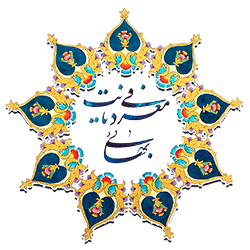بند صد و بیست و ششم
In another passage of the Gospel it is written: “And it came to pass that on a certain day the father of one of the disciples of Jesus had died.” That disciple reporting the death of his father unto Jesus, asked for leave to go and bury him. Whereupon, Jesus, that Essence of Detachment, answered and said: “Let the dead bury their dead.”
بند صد و بیست و هفتم
In like manner, two of the people of Kúfih went to ‘Alí, the Commander of the Faithful. One owned a house and wished to sell it; the other was to be the purchaser.
بند صد و بیست و هشتم
In every age and century, the purpose of the Prophets of God and their chosen ones hath been no other but to affirm the spiritual significance of the terms “life,” “resurrection,” and “judgment.”
بند صد و بیست و نهم
Similarly, the records of all the scriptures bear witness to this lofty truth and this most exalted word. Moreover, this verse of the Qur’án, revealed concerning Hamzih, the “Prince of Martyrs,” and Abú-Jahl, is a luminous evidence and sure testimony of the truth of Our saying:
بند صد و سی
Thou dost witness today how, notwithstanding the radiant splendor of the Sun of divine knowledge, all the people, whether high or low, have clung to the ways of those abject manifestations of the Prince of Darkness.
بند صد و سی و یک
To resume: Our purpose in setting forth these truths hath been to demonstrate the sovereignty of Him Who is the King of kings. Be fair: Is this sovereignty which, through the utterance of one Word, hath manifested such pervading influence, ascendancy, and awful majesty,
بند صد و سی و دوم
This is but one of the meanings of the spiritual sovereignty which We have set forth in accordance with the capacity and receptiveness of the people. For He, the Mover of all beings, that glorified Countenance, is the source of such potencies as neither this wronged One can reveal, nor this unworthy people comprehend. Immensely exalted is He above men’s praise of His sovereignty; glorified is He beyond that which they attribute unto Him!
بند صد و سی و سوم
And now, ponder this in thine heart: Were sovereignty to mean earthly sovereignty and worldly dominion, were it to imply the subjection and external allegiance of all the peoples and kindreds of the earth—whereby His loved ones should be exalted and be made to live in peace, and His enemies be abased and tormented—such form of sovereignty would not be true of God Himself, the Source of all dominion, Whose majesty and power all things testify.
بند صد و سی و چهار
Know, therefore, O questioning seeker, that earthly sovereignty is of no worth, nor will it ever be, in the eyes of God and His chosen Ones. Moreover, if ascendancy and dominion be interpreted to mean earthly supremacy and temporal power, how impossible will it be for thee to explain these verses: “And verily Our host shall conquer.”
بند صد و سی و پنجم
Were the idle contention of these foolish and despicable souls to be true, they would have none other alternative than to reject all these holy utterances and heavenly allusions. For no warrior could be found on earth more excellent and nearer to God than Husayn, son of ‘Alí, so peerless and incomparable was he. “There was none to equal or to match him in the world.” Yet, thou must have heard what befell him. “God’s malison on the head of the people of tyranny!”
بند صد و سی و ششم
Were the verse “And verily Our host shall conquer” to be literally interpreted, it is evident that it would in no wise be applicable to the chosen Ones of God and His hosts, inasmuch as Husayn, whose heroism was manifest as the sun, crushed and subjugated, quaffed at last the cup of martyrdom in Karbilá, the land of Taff.
بند صد و سی و هفتم
But the purpose of these verses is not what they have imagined. Nay, the terms “ascendancy,” “power,” and “authority” imply a totally different station and meaning. For instance, consider the pervading power of those drops of the blood of Husayn which besprinkled the earth.

